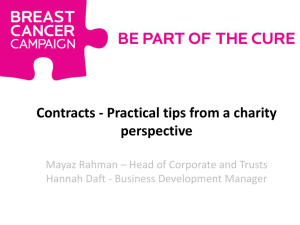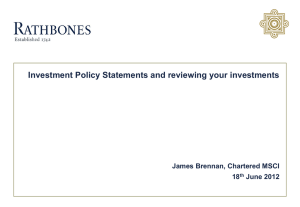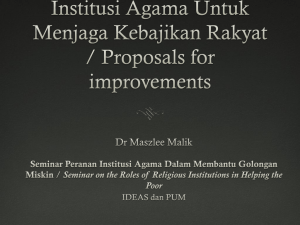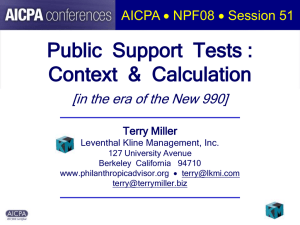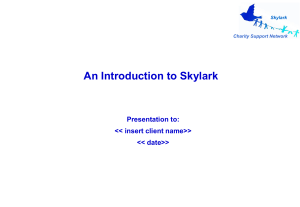Understanding the Duties of a Trustee
advertisement
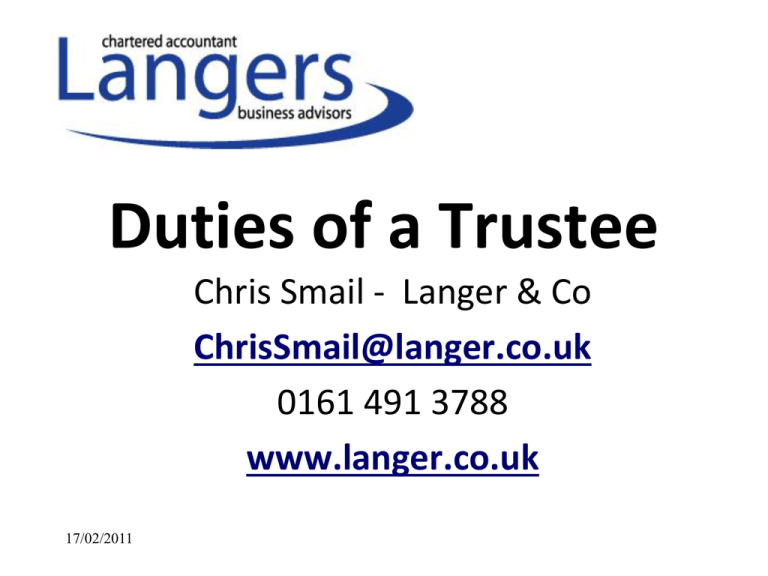
Duties of a Trustee Chris Smail - Langer & Co ChrisSmail@langer.co.uk 0161 491 3788 www.langer.co.uk 17/02/2011 Why am I here? Member Trustee Acountant Why are you here? ? Why are we here? Lots of Guidance already available Charity Commission NCVO SCC/Trusteenet Who is a Trustee? 17/02/2011 Who is a Trustee? Charity trustees are the people who form the governing body of a charity. They may be known as trustees, directors, board members, governors or committee members. Trustees are responsible for controlling the management and administration of a charity. Duties of a Trustee? Duties of a Trustee? Act in the best interests of the Charity Duties of a Trustee – CC3a Ensuring compliance Duty of prudence Duty of care Ensuring compliance Charity Law Objects of Charity Other Legislation Integrity Charity Law Charity law, and the requirements of the Charity Commission as regulator; in particular you must ensure that the charity prepares reports on its work, and submits Annual Returns and accounts as required by law. See also CC10 – Hallmarks – (Later) Objects The requirements or rules, and the charitable purpose and objects, set out in the charity's own governing document. All trustees should have a copy of this document, and be familiar with it. Other Legislation The requirements of other legislation and other regulators (if any) which govern the activities of the charity; these will vary according to the type of work the charity carries out, and whether it employs staff or volunteers. Integrity The requirement for trustees to act with integrity, and avoid any personal conflicts of interest or misuse of charity funds or assets. Integrity You should check the charity's governing document for provisions relating to conflicts of interest and you can find more information on the Ch Com website guidance on conflicts of interest and in CC11 Trustee expenses and payments Duties of a Trustee – Prudence Solvent Wise use of funds No undue Risk Cautious investment and borrowing Duty of Prudence - Solvent Ensure that the charity is and will remain solvent; this means that you need to keep yourself informed of the charity's activities and financial position. Duty of Prudence – Use of Funds Use charitable funds and assets wisely, and only to further the purposes and interests of the charity. Duty of Prudence - Risk Avoid undertaking activities that might place the charity's property, funds, assets or reputation at undue risk. Duty of Prudence - Caution Take special care when investing the funds of the charity, or borrowing funds for the charity to use. Duty of Care Reasonable Skill & Care Professional Advice Reasonable Skill & Care Exercise reasonable care and skill as trustees, using personal knowledge and experience to ensure that the charity is well-run and efficient (CC8 Financial Controls) Keep informed of activities and finances Keep minutes of meetings and ensure actions completed (CC48) Professional Advice Consider getting external professional advice on all matters where there may be material risk to the charity, or where the trustees may be in breach of their duties. CC33 - Acquiring Land 18. We strongly recommend that trustees proposing to buy land, whether for investment purposes or for use by the charity, obtain a report from a qualified surveyor who is acting solely for the trustees. CC28 disposing of charity land D1 If you are carrying out one of these types of disposals you must: obtain and consider a written report from a qualified surveyor; advertise the disposal following advice from your surveyor; and decide you are satisfied that the proposed terms are the best that can reasonably be obtained in the circumstances of the disposal. Duties of a Trustee CC10 Hallmarks of an effective Charity 1: Clear about its purposes and direction 2: A strong board 3: Fit for purpose 4: Learning and improving 5: Financially sound and prudent 6: Accountable and transparent Hallmark 1: Clear about its purposes and direction An effective charity is clear about its purposes, mission and values and uses them to direct all aspects of its work. Hallmark 2: A strong board An effective charity is run by a clearly identifiable board or trustee body that has the right balance of skills and experience, acts in the best interests of the charity and its beneficiaries, understands its responsibilities and has systems in place to exercise them properly. Hallmark 3: Fit for purpose The structure, policies and procedures of an effective charity enable it to achieve its purposes and mission and deliver its services efficiently. Hallmark 4: Learning and improving An effective charity is always seeking to improve its performance and efficiency, and to learn new and better ways of delivering its purposes. A charity's assessment of its performance, and of the impact and outcomes of its work, will feed into its planning processes and will influence its future direction. Hallmark 5: Financially sound and prudent An effective charity has the financial and other resources needed to deliver its purposes and mission, and controls and uses them so as to achieve its potential. Hallmark 6: Accountable and transparent An effective charity is accountable to the public and others with an interest in the charity in a way that is transparent and understandable. Disclaimer This presentation is made available on the basis that no liability is accepted for any errors of fact or opinion they may contain. Professional advice should be obtained before applying the information in any particular circumstances. 17/02/2011 Duties of a Trustee Chris Smail - Langer & Co ChrisSmail@langer.co.uk 0161 491 3788 www.langer.co.uk 17/02/2011
